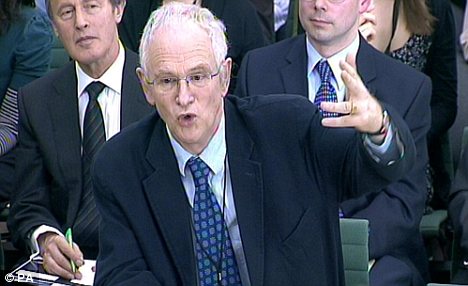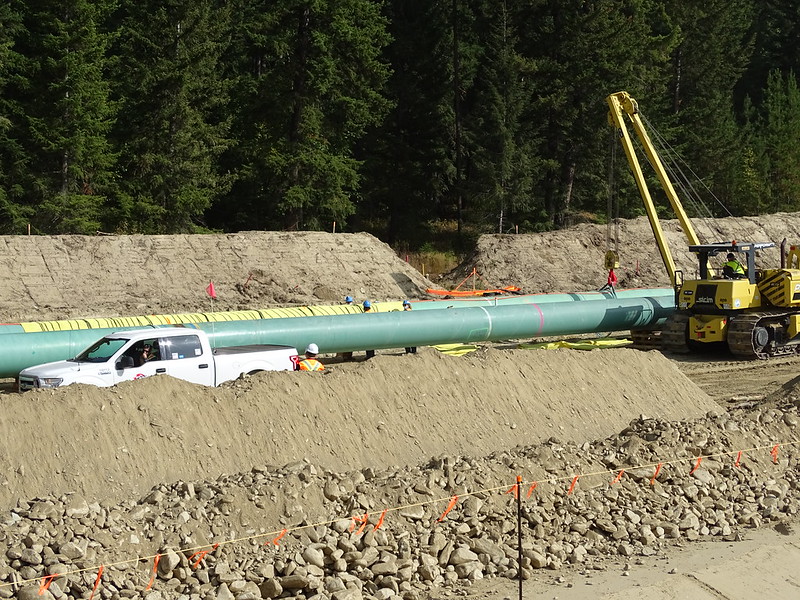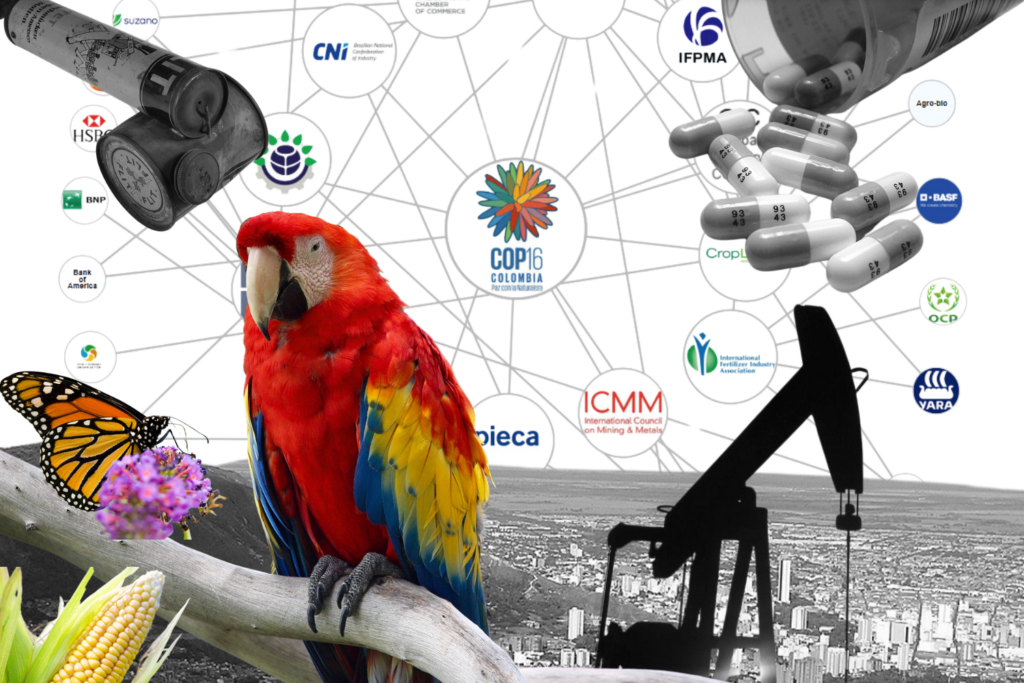Lawson achieves his first major political victory by ensuring a powerful Parliamentary committee investigates ‘climategate’ in the second of our three part inaugural series, An Honourable Man.
Lord Lawson was bathed in light as the cameras pulled to focus and proceedings began. Just three months after the founding of his climate denial foundation and he was called to give evidence to a committee hearing that he had himself first demanded.
The Science and Technology Committee at the House of Commons was in session. The once-chancellor sat on the felt green chair and arranged his papers, flanked by trusty side-kick Dr Benny Peiser.
The two men were characterised by one Parliamentary sketch-writer as “a flamboyant double act” supported by a third man who “wore a multicoloured waistcoat that would not have been out of place in a casino” and “passed occasional prompting notes.” Lawson spluttered into the microphone: “Proper scientists, scientists of integrity, wish to reveal all their data.”
This barb was aimed at Professor Phil Jones (pictured), the grey-corduroy wearing director of the Climatic Research Unit at the University of East Anglia. Jones had been held up by the media as “the great prophet” of climate change, the scientist who had persuaded world governments to sacrifice their national economies on the altar of the “precautionary principle”.
Jones was as familiar to us as any family GP: softly-spoken, unassuming and reassuringly dull even when delivering his traumatic prognosis. His job had been to collate and interpret data from around the world and present the average global temperature, often using easy-to-understand graphs.
When he started in the 1970s it seemed the world was getting slightly colder, but over the past decades it was getting warmer, at a faster rate than during any other time in the Earth’s history as far back as we can tell.
Jones loathes the limelight and appeared before his inquisitors ashen-faced and shaking. During sleepless nights leading up to his appearance before the committee, the humble researcher had given serious thought to taking his own life, leaving behind his supportive wife Ruth and two children, Matthew and Hannah.
One macabre journalist at the hearing noted that “not since the late David Kelly has a select committee witness looked so queasy.”
Jones’s mystical knowledge and complex jargon began to sound like obfuscation, conspiracy and guilt. “I have sent some pretty awful emails,” he confessed before the panel of MPs. Arthur Miller, author of famous witch-hunt parable The Crucible, could have scripted this sorry scene. Scientists like Jones present an appalling prognosis.
They suggest that decisions we take during the course of the next decade could— thousands of years from today—theoretically lead to the extinction of the human species, life on earth and therefore the only known life in the universe.
Venus infers
Chris Rapley, professor of climate change at University College London, has said: “On the apocalypse: there is a threat. Feasibly you could have runaway global warming and we could turn out like Venus. It is a tiny, tiny, probability, but it is there. You have to weigh that up”. The Earth is home to the only known life in the universe. Even if the odds are low we are gambling with the future of life itself.
But the Tory grandee Lord Lawson does not buy into this “alarmism”. He interprets events differently: Jones and his fellow climate scientists in Britain and America lack “integrity”. The “climate sceptics” were adamant that the stolen emails were cast-iron proof that Jones had attempted to “hide the decline” in global temperatures to defend the scientific consensus that climate change was real and terrifying.
Like a fretful pantomime audience warning “he’s behind you,” the sceptics alleged in notes to the committee that Jones had committed “scientific fraud”. These scientists had together exaggerated the threat. They were just rent-seekers, making their findings seem terribly important to get more government funding – taxpayers’ money. That’s what they say.
Jones still does not understand Lawson’s attack. He finds it difficult to comprehend how a retired politician can claim to have discovered a conspiracy of complacency and deceit in an academic field populated by some of the greatest minds of the age, riven with professional rivalry where reputations are made not from supporting the current consensus but by shattering it. He is bemused as to why the GWPF resurrects scientific controversies and uncertainties that have been resolved publicly through peer-reviewed literature decades earlier. Lawson, after all, is an honourable man.
The chorus of authorities is disharmonious
The committee after many days of evidence and deliberations found in Jones’s favour. The chairman said his inquiry had not “found any evidence whatsoever that there was anything other than honesty at UEA”. There were four further inquiries into the claims of the sceptics: none found any evidence that they were true.
But the true significance of Climategate is not to be found in thick parliamentary reports but instead in the minds of the public. When the hacker breached the university servers a great chasm was opened between conflicting groups of British civil society, both claiming to best represent what is honest, true and in the public interest.
Until then the message was terrible, but it was clear. Authority spoke as if with one voice. Jones and his fellow climate scientists appeared to have the unflinching support of the leaders of every major political party, of Prince Charles, our heir to the throne, of civil servants in every department of state, of celebrities from both high and popular culture, of academics in all the leading institutions.
All the while, young activists protesting under black, red, green and white flags sang with unprecedented harmony of the perils of climate change, demanding urgent action. The only vocal dissent back then was from the oil industry (quelle surprise), a few tainted think tanks and the extremes of American Republicanism.
But now, the body politic has become divided. The chorus of authorities is disharmonious. We face two sides, each speaking in the voice of reason, each pitched against the other, each claiming objectivity: each describing the other as a wild-eyed snake, charming us with hypnotic words, tempting us with knowledge, bringing about our expulsion from this garden of Eden. It’s the “climate alarmists” versus the “climate deniers”.
Serious Allegations
Lawson is an honourable man and has lent his credibility to the deniers’ attack on science. He has forced the country to take seriously allegations made by the deniers over the last three decades and almost universally dismissed as ridiculous. He has caused confusion and uncertainty.
There is now trouble at the top as Cameron’s platitudes and environmental paternalism grate against Osborne’s economic determinism and his attack on the “environmental Taliban”. Both sides will be desperate to hide this inner conflict during the Conservative party conference next month. The ‘turquoise Tories’ fear an ageing membership agreeing with Lawson and his candid view that future generations matter less.
Outside politics, retired geologists at the Royal Society have become pitted against research physicists. The BBC is torn asunder by the desperate desire to be objective and their well-meaning attempt to provide balance. The Telegraph is in two minds with its commentators attacking its own reporters publicly and privately.
Prince Charles is damned for using his influence over democratic decisions on climate policy by those who support his Royal prerogative and vice versa. The oil companies themselves are at war, some gushing about renewables and others just digging deeper.
Even families are divided, with the funders of the GWPF fearing the judgment of their grandchildren. If we see both sides as being as bad as each other and do nothing, we have effectively sided with the sceptics.
Not deciding who is right and who is wrong is, tragically, not an option. Taking the wrong side, both sides agree, will have deadly consequences for millions of people. It has to be Lawson or the science.
There are many great and strategic minds who believe that without the sceptics, public concern about climate change would be far greater, which in turn would force politicians to take heed of their electors; they would leap into action and force industry polluters and big oil to turn to clean, renewable energy and stop climate change.
If this is so, if what Lawson is telling us is simply wrong, the implications are unthinkable. And if he is wrong, we must ask: how could someone of such political calibre so fundamentally misjudge an issue as significant as climate change? He is, after all, an honourable man.
Friday: The final of our three part inaugural series, An Honourable Man – Lawson’s funders provide an important clue to the true motives of climate deniers, and also a link to the long history of oil and tobacco funded attacks on science and scientists. And catch up with the first installment now.
Subscribe to our newsletter
Stay up to date with DeSmog news and alerts







